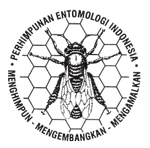Potensi Insektisida Pasak Bumi (Eurycoma longifolia Jack) terhadap Hama Kubis Crocidolomia pavonana (F.) (Lepidoptera: Crambidae)
DOI:
https://doi.org/10.5994/jei.6.1.21Keywords:
extract, mortality, bioactivity, Eurycoma longifolia, Crocidolomia pavonanaAbstract
The research was conducted at Laboratory of Insect Physiology and Toxicology of Plant Protection Department of Bogor Agricultural University from May to July 2008. Leaves, twigs, barks, and roots of Eurycoma longifolia (Pasak bumi) were extracted with hexane, ethyl acetate, and methanol solvens. The extraction was used single method and level method. Insecticidal activity of each extract has been examined in laboratory to major cabbage pests Crocidolomia pavonana using leaf residual method. Methanol root extract from single method and level method caused 100 and 75.5% mortality of insect test respectively. Hexane and ethyl acetate extracts of leaves, twigs, and barks have low insecticidal activity. The antifeedant effect worked at insect test and varied depends on concentration level. Antifeedant effect also contributed to mortality of larvae along with toxicity of each extract.Downloads
Downloads
Published
How to Cite
Issue
Section
License
Authors who publish with this journal agree to the following terms:
- Authors retain copyright and grant the journal right of first publication with the work simultaneously licensed under a Creative Commons Attribution 4.0 International License that allows others to share the work with an acknowledgement of the work's authorship and initial publication in this journal.
- Authors are able to enter into separate, additional contractual arrangements for the non-exclusive distribution of the journal's published version of the work (e.g., post it to an institutional repository or publish it in a book), with an acknowledgement of its initial publication in this journal.
- Authors are permitted and encouraged to post their work online (e.g., in institutional repositories or on their website) prior to and during the submission process, as it can lead to productive exchanges, as well as earlier and greater citation of published work (See The Effect of Open Access).








